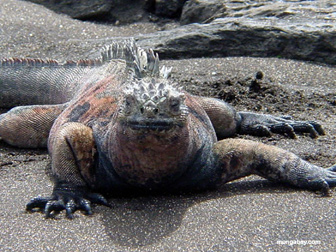Nature tourism taking a toll in the Galapagos
Nature tourism taking a toll in the Galapagos
mongabay.com
January 5, 2008
|
|
A booming “ecotourism” industry is bringing new threats to the Galapagos, reports a feature in the Wall Street Journal.
Unsustainable tourism development, an influx of workers from the mainland, and introduced species are putting endemic biodiversity and habitats at risk.
“The islands’ fragile ecosystem can be easily disrupted, particularly as the increasing number of planes and ships landing in the Galapagos bring foreign species. Whether insects, snakes or feral cats and dogs, the invaders can wreak havoc by destroying plants and other food sources, eating eggs or attacking birds or mammals,” writes Stan Sesser.
 Marine iguana in the Galapagos |
While the Ecuadorian government has recently announced measures to control commercial fishing, restrict immigration, and mitigating damage from alien invasive species, its toughest challenge is addressing tourism.
“It’s not a simple solution, because to limit tourism will be to limit income,” Mauricio Castillo, an official for Unesco in Quito, told the paper.
“Galapagos Under Siege” by Stan Sesser. The Wall Street Journal January 5, 2008; Page W1
Related
Galapagos Marine Iguanas eavesdrop on mockingbirds to avoid predation. As the world’s only sea-feeding lizard, Galapagos Marine Iguanas have long held a unique place in the animal kingdom. While most of their life is spent on land, these lizards forage the seas for their staple food: algae. Now, new research has provided this species with another distinction: although the Galapagos Marine Iguana is mute, it recognizes and utilizes the alarm call of the Galapagos Mockingbird. This is the first instance of a non-vocal species eavesdropping on another species’ calls. Both the iguana and mockingbird fall prey to the Galapagos hawk, so by recognizing the mockingbird’s warning the iguanas gain important information on avoiding predation.